| Srl | Item |
| 1 |
ID:
165906
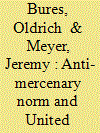

|
|
|
|
|
| Summary/Abstract |
This article offers an analysis of the influence of the anti-mercenary norm on the United Nations’ use of services provided by private military and security companies (PMSCs). It follows a constructivist approach which focuses on violations of the anti-mercenary norm within the UN system and on the justifications and condemnations of these violations in official UN documents. The findings suggest that while the anti-mercenary norm is no longer puritanical, two key aspects of the norm—the lack of a proper cause and the lack of control—remain influential within the UN system. Although all parts of the UN system nowadays routinely use a wide variety of services of PMSCs and the UN Secretary-General officially sanctioned security outsourcing in 2011, the UN continues to insist that it is only using PMSCs as a last resort, when no other options are available. The continuing need to justify the use of PMSCs’ services suggests that this practice challenges both the long-established identity of the UN as a key anti-mercenary norm entrepreneur and its ontological security.
|
|
|
|
|
|
|
|
|
|
|
|
|
|
|
|
| 2 |
ID:
165903


|
|
|
| 3 |
ID:
165907
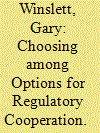

|
|
|
|
|
| Summary/Abstract |
When states face a regulatory difference that impedes commerce between them, they have a range of options to choose from in how to pursue regulatory cooperation on that issue. They may attempt to unilaterally impose their position, attempt to negotiate binding agreements, promote mutual recognition, utilize networked governance, create private standards, rely on business self-regulation, or choose not to pursue cooperation. Each of these choices has implications for the commerce and international relations on that issue, and so the choice of policy route is of vital importance. This article builds on lobbying, regulation, and trade scholarship to advance a theory that explains how states choose a regulatory cooperation pathway.
|
|
|
|
|
|
|
|
|
|
|
|
|
|
|
|
| 4 |
ID:
165908


|
|
|
|
|
| Summary/Abstract |
Global Internet governance is unique in that it officially adopted a multi-stakeholder decision making procedure instead of a state-driven international cooperation modality. We focus on the role of the Internet epistemic community in Asia, which can explain the emergence of the current norms of Internet coordination and the Internet governance structure. By sharing the most advanced knowledge from global discussions and by organizing regional cooperation platforms starting from the early 1980s, Asian Internet technical professionals created Internet coordination norms based on open contribution and led the stewardship from the early stage of Internet development in the region. Based on a review of historical documents on the early development of the Internet in Asia, we show that the Internet epistemic community in Asia has played a critical role in designing and managing the current formation of regional Internet governance regimes, as well as their working norms starting from the early stage of Internet development in the region.
|
|
|
|
|
|
|
|
|
|
|
|
|
|
|
|
| 5 |
ID:
165902


|
|
|
| 6 |
ID:
165905
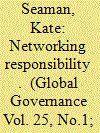

|
|
|
|
|
| Summary/Abstract |
The rapid rise of the Responsibility to Protect and its establishment within the global lexicon is nothing short of astounding. However, there are a number of questions that remain unanswered: Who has the Responsibility to Protect? Who are they protecting? What are the wider implications of this concept of responsibility? How is the concept being operationalized? Regional and subregional organizations are seen as key actors in the operationalization of the Responsibility to Protect, providing increased legitimacy and accountability. This article situates these organizations within a wider “network of responsibility” and examines the impact this engagement has on norm contestation, diffusion, development, and operationalization. The article highlights the potential that regional and subregional organizations have for acting as “linchpins” within a network of responsibility. It also demonstrates the challenges surrounding this role, and the wider implementation and operationalization of the concept.
|
|
|
|
|
|
|
|
|
|
|
|
|
|
|
|
| 7 |
ID:
165909
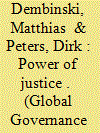

|
|
|
|
|
| Summary/Abstract |
Complaints about “double standards” in global governance are widespread. When governments from the Global South criticize powerful Western states for applying double standards in implementing norms such as international criminal justice, this is usually taken to indicate that they disagree with the substance of these norms. In contrast, this article argues that the criticism can also be understood as expressing dissatisfaction with the procedures for applying those norms. Based on insights from empirical justice research in social psychology, the article highlights the significance of procedural fairness for the legitimacy of institutions and illustrates the importance of concerns about procedural unfairness in recent complaints about the International Criminal Court (ICC) by African governments.
|
|
|
|
|
|
|
|
|
|
|
|
|
|
|
|
| 8 |
ID:
165910
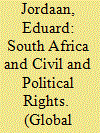

|
|
|
|
|
| Summary/Abstract |
For constructivists, a state’s identity implies its preferences, interests, and resultant actions in international affairs, which is why constructivists expect democracies to support human rights internationally. This study examines South Africa’s record on civil and political rights at the UN Human Rights Council. While there is an element of anti-imperialism in South Africa’s identity that might help explain some of its actions, human rights remain important in South Africa’s self-understanding. Despite the presence of human rights in South Africa’s identity, at the Human Rights Council, South Africa’s actions have ranged from failing to uphold civil and political rights to supporting their restriction. A bifurcated national identity therefore diminishes the predictive power of a constructivist national identity approach.
|
|
|
|
|
|
|
|
|
|
|
|
|
|
|
|